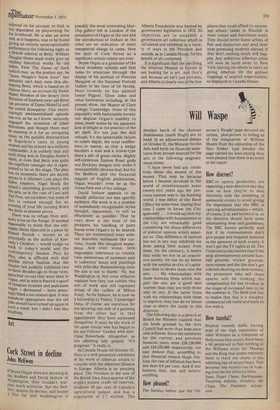W il l W as p e
Another batch of the choicest Jenkinsiana (mark Hugh) are to hand. In an adjournment debate on October 21, the Minister for the Arts held forth on financial assistance from private sources for the arts in the following magnanimous terms: "I have never had any inhibitions about the source of the money. That may be because before I became involved in the world of entertainment some twenty-five years ago my previous interest was in the banking world. I was editor of the Bank Officer for some time. During that time I came to know the City quite well. . .1 would say that my relationships with businessmen in the City are remarkably good considering the sharp differences of political opinion which separate us. That difference of opinion has not in any way inhibited me from taking their money from them. On the contrary, it seems that while we live in an acquisitive society we can do no better with the surplus profits of capitalism than to divers them into the arts . . . My relationships with those business firms which support the arts are a good deal warmer than they are with those who do not. If the latter firms wish my relationships with them to improve, they can do no better than to direct the funds in this direction ..."
The following day in a speech at Bristol the Minister claimed that the funds granted to the Arts Council had more than kept pace with inflation. Since the estimates for the current and previous financial years were e26,150,000 and 624,535,000 respectively, we may deduce that, according to that financial wizard Hugh Jenkins, the rate of inflation has been less than 6.6 per cent. And if one believes that, one will believe anything.
How pleased?
The Sunday before last the Ob server's 'People' page devoted six inches, plus picture, to telling us of the resignation of William Shawn from the editorship of the New Yorker. Last Sunday the page carried six lines saying they were pleased that there is no truth in the report.
How discreet?
BBC-tv sports producers are expecting a new directive any day now on how they're to deal discreetly with the screening of sponsored events to avoid giving the impression that the BBC is carrying advertisements which, of course, it is, and knows it is, so the directive should have some entertaining lines and guidelines. The BBC knows perfectly well that if its commentators don't give proper and frequent mention to the sponsors of such events, it won't get the TV rights at all. The Corporation also knows that if the strip advertisements around football grounds, cricket grounds, racecourses and the like don't get a decent showing on their screens, the promoters who sell those spaces will be looking for compensation for lost revenue in the shape of increased fees to let the cameras in. The Beeb just has to realise that this is a naughty commercial old world and learn to live with it.
How tuneful?
Musical comedy buffs, having read of the high reputation of John Williams as a composer of Hollywood film scores, have been a bit perplexed to find nothing in the Williams score for Thomas . and the King that seems remotely likely to reach the charts or the whistling lips of errand boys. This becomes less mysterious of looking over the list of his hit films . . . Jaws, Paper Chase, Earthquake, Towering Inferno, Goodbye Mr Chips. The Poseidon Adventure....
































 Previous page
Previous page